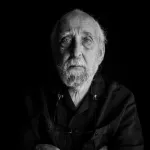The whiskey on your breath
Could make a small boy dizzy;
But I hung on like death:
Such waltzing was not easy.
We romped until the pans
Slid from the kitchen shelf;
My mother’s countenance
Could not unfrown itself.
The hand that held my wrist
Was battered on one knuckle;
At every step you missed
My right ear scraped a buckle.
You beat time on my head
With a palm caked hard by dirt,
Then waltzed me off to bed
Still clinging to your shirt.
The poet writes a complex poem about his relationship with his father.
- Why do you think the poet chose the title “My Papa’s Waltz” instead of others he considered - “My Father’s Dance,” “Dance with Papa” and “The Dance”? What does the title “My Papa’s Waltz” suggest that the others don’t?
- Can you see how this poem is an extended metaphor, a waltz? The poet’s four quatrains (four-line stanzas), contain three stresses in each line (the whiskey on your breath). A waltz has three/four time. The lines are all end-stopped, meaning each is a separate unit - like measures in music. The rhymes give the poem a musical sound. Read the poem aloud and hear it how it’s like a waltz.
- Originally this poem read “my forehead scraped a buckle” and Roethke changed it to “scraped my right ear.” The poem read “could make a small girl dizzy,” and he revised to “could make a small boy dizzy.” “Kept time on my head” became “beat time on my head.” Do these changes change the tone of the poem, the way you understand it? If yes, how? Why might Roethke have made these revisions?
- Overall, what is the tone of “My Papa’s Waltz”? What choices has the poet made to create that tone? This poem has elicited very different interpretations from critics. Read it aloud several times to hear how it sounds and notice the feeling you get.
- Now read the poem aloud again: first in a “playful dance” way, and then in a darker, “potential mistreatment” way. Does one seem to fit better? Or does the poem go back and forth, contain both?
- Sometimes a poet’s biography can provide clues – how does it change your understanding of the poem to know Roethke’s father died when he was 14?
- Write a poem about an experience with a family member or other beloved in which you express complex, conflicting feelings. Use Roethke’s poem as a model if you wish.
Useful links:
Listen to Theodore Roethke read his poem, “My Papa’s Waltz”
https://www.youtube.com/watch?v=a6_4eNVZHXk
Learn more about Roethke’s poetry in this podcast, and hear him read additional father poems: Theodore Roethke: Essential American Poets
https://www.poetryfoundation.org/audio/75256/theodore-roethke-essential-american-poets
Check out Roethke’s biography, and learn why he wrote poems that drip with ambivalence about the extensive greenhouses his father Otto owned. He wrote: “They were to me, I realize now, both heaven and hell, a kind of tropics created in the savage climate of Michigan, where austere German Americans turned their love of order and their terrifying efficiency into something beautiful.”





